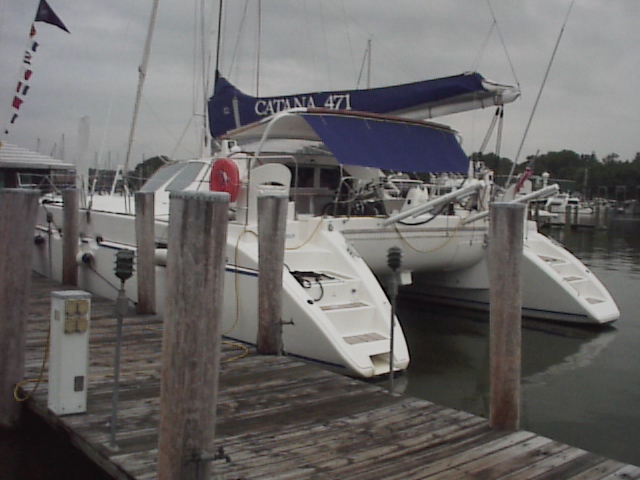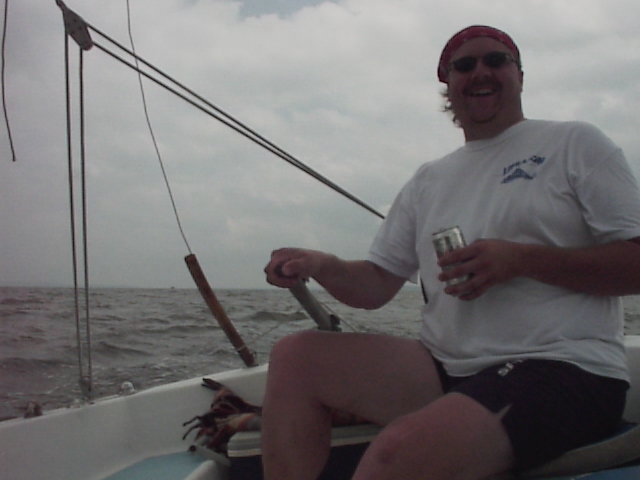
This particular weekend was three days long: Friday, Saturday and Sunday. Dennis' schedule was alright and so was mine, so off we went.
 The
following is the daily record of our adventure with little detail left
out.
The
following is the daily record of our adventure with little detail left
out.
We tacked back and forth for seemingly three or four hours, talking about life, fun, troubles, friends and paying not that much attention to the time. Dennis took the helm for a while and was learning the responses of the boat to the tiller. He learned quickly about how she works and was guiding us around the Bay as well.
Throughout the day there was so much to see. We saw birds diving for fish. We saw tugboats, ships and pleasure boats all along the way too. We discussed the importance of giving them plenty of space while on the water. We also reviewed my uncle's three general rules about sailing:
In the late afternoon, Dennis turned the boat toward Sassafras River and up the mouth we motored. The wind was dropping for the evening, so we felt it would be good to make for port. Up the river we motored. If you're familiar with that particular estuary, it winds quite a bit until you finally reach the quiet little town of Georgetown. As much fun as it is to wander the open waters, there's also something to be said for resting at night.
We rented a mooring at the Georgetown Yacht Basin, cleaned up,
then went to the local deli, The Harbor Cafe & Pizzeria (410-275-2963). The food there was definitely more than one can handle in one sitting. One could order from a simple toasted cheese sandwich to a full Thanksgiving dinner with wine (someone DID that!) and they'd have it ready. The atmosphere was just what we needed at the end of a daysail.

After dinner, back to the boat. We toured the docks on our way out to Windswept. We couldn't help but notice some foreign boats and other larger craft. It's always good to gawk. On the boat, we had a couple of beers, played guitar, talked more and looked at the water. Using Dennis' near-Klieg quality flashlight, we shined it on the water surface and saw what looked like a fog of insects right there on the surface of the water. We were somewhat amazed they weren't mosquitos eating us alive, but they seemingly did not go any higher than two inches off the surface. Thank God for that!
After dousing the genoa and still keeping pace with the main alone, we headed for the Bush River. We had no idea what was up this one, but we were determined to find out. After finally finding the marking buoys, we rounded them and headed in the mouth. The skies returned to a favorable blue as we made progress, but the wind kept up. Up the river, past US Army observation posts, and past an indescribable site, we approached a railroad bridge. At this point, I need to interject that the Bush River is surrounded on both sides by the US Army's Aberdeen Proving grounds. This means that there is no landing whatsoever, even to relieve a bladder.
The bridge before us was a drawbridge. It was about 4:30 on a Saturday afternoon. I turned on the VHF to channel 16 and hailed the bridge master or the harbormaster and got nothing. We were still approaching when I noticed a sign near the movable portion. It was Amtrak and they stated they listen to channel 13. Flip to 13 and try again. Nothing. Now we dropped anchor because we were drifting with the strong winds. The stinkpotters were coming and going under the bridge, because they had clearance, but my mast at 25' above water surface was a no-go. There were others on the VHF who were only cursory help. I got out the cell phone and tried calling Amtrak. No one knew what was going on, in the fact that I couldn't reach the person who controlled the bridge. Then the first train came.
It was hard to describe the sound when the first one came, but it's close to rolling thunder. The train was definitely and Amtrak commuter and it must've been going at 60-80mph. When it rolled over the movable portion, all-steel by the way, it was deafening. It dawned on us that the only way we'd get our boat under that bridge is to abide by a strict schedule. This bridge was not going to raise just because a boat wanted to get by. This bridge was going to raise when there was guaranteed NO rail traffic coming or going for a long time.
Finally in contact with a yacht club administrator, I had learned there WAS a strict schedule and that the bridge raises only two times a day, once at 9am and then again at 5pm. Looking at my watch, we had arrived over a half-hour ago and it was now 5:15. We had been there right through the window of opening and nothing happened! The yacht club administrator said that the weekend schedule was slightly different and that we should hang on just a little longer.
We gave up and decided it was better to simply find a place to drop anchor for the night. We didn't want to stay where we were, because we'd never sleep with those trains screaming by. We raised anchor, which is when we realized that we had actually dropped in an area of a submerged cable. Doh!!! Nothing came up with the anchor, so we were safe. We motored about a mile away and dropped anchor once more, less than a hundred yards off the shoreline. We could clearly read the US Army signs posted every quarter mile on the shoreline. Hmmm, guard dogs?
We essentially made camp right there. Using the boat hook, I felt the
bottom and felt sick to my stomach. The bottom was a soft silt bed. I would
hate to have to stand in that and be sucked under. However, such a soft
bottom also meant that the anchors will hold even in the worst of hurricanes.
We made dinner, drank Rum & Cokes and talked about the day. Getting
out the chart book, we assessed that we had sailed about fifteen miles
today. After cleaning up, we returned to the cockpit with our jug of rum
and sat out in the evening setting sun. Reading our fine literature and
playing guitar for awhile, we noticed a small family of ducks approaching.
We pulled out a few hamburger rolls and sent them bits of bread. Then we
got the brilliant idea of feeding them bread with rum in them. So, we soaked
the bread in rum and tossed them. The ducks lost interest and swam away.
Dennis called his girlfriend and chatted with her for a while. Then we
decided to call an old friend from high school and let him know where we
were. Remember, we're quite inebriated at this point. The details of the
call need not be related here. Just before the end of the night, I reviewed
my understanding of the Morse Code characters with the flashlight, sending
rather unsavory messages to other boats at anchor.

We turned in and slept.
One note I should add here. As we drank a beer, we would simply drop the empty can to the cockpit floor. As the days went by, we had accumulated a lot of rattling aluminum. When Windswept heeled, we were reminded of our consumption. When we adjusted our feet or moved about the cockpit, we were reminded of our consumption. When another can was thrown into the pile, we were reminded of our consumption. Then we'd let out a hearty, manly growl. Satisfaction came easy that weekend.
We motored, we sailed. As we approached Rogue's Harbor, the wind died and we were also moving against the tidal flow. This left us no choice but to motor. Within a mile of the dock, the red jerry can ran dry. We were practically in a panic. Only a mile from home and we were out of drive. We raised sail once more in a freshening breeze, but the angle would not let us return to the dock, for it was directly upwind. We were in a pickle.
In a flash, I decided to see if any more gas remained in the bottom of the tank and somehow get it into the motor. I opened the can and tilted it. There had to be a whole quart of fuel in there! It was the dip tube that didn't reach it. No matter how I would tip the can, it wouldn't reach the dip tube. I removed the hose at the fitting outside the can, tilted it at 45° and then shoved the hose into the bottom of the new funnel. Squeeze the primer bulb and restart the motor. Damn, that was close.
Dennis doused the sails once more. We made it to the dock and tied on. Home at last. Forty miles more under the belt.